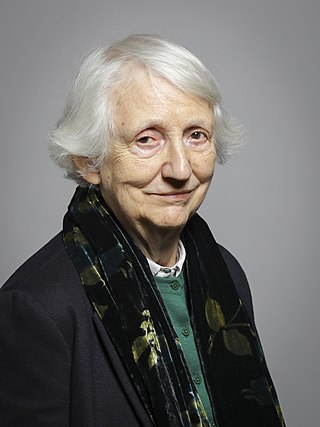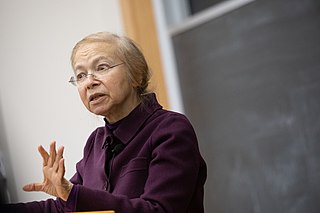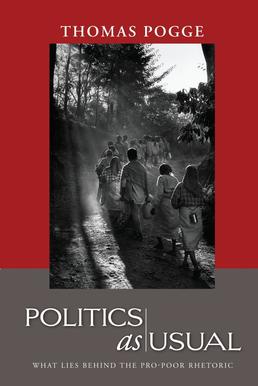Related Research Articles
Social justice is justice in relation to a fair balance in the distribution of wealth, opportunities, and privileges within a society where individuals' rights are recognized and protected. In Western and Asian cultures, the concept of social justice has often referred to the process of ensuring that individuals fulfill their societal roles and receive their due from society. In the current movements for social justice, the emphasis has been on the breaking of barriers for social mobility, the creation of safety nets, and economic justice. Social justice assigns rights and duties in the institutions of society, which enables people to receive the basic benefits and burdens of cooperation. The relevant institutions often include taxation, social insurance, public health, public school, public services, labor law and regulation of markets, to ensure distribution of wealth, and equal opportunity.
Bioethics is both a field of study and professional practice, interested in ethical issues related to health, including those emerging from advances in biology, medicine, and technologies. It proposes the discussion about moral discernment in society and it is often related to medical policy and practice, but also to broader questions as environment, well-being and public health. Bioethics is concerned with the ethical questions that arise in the relationships among life sciences, biotechnology, medicine, politics, law, theology and philosophy. It includes the study of values relating to primary care, other branches of medicine, ethical education in science, animal, and environmental ethics, and public health.

Onora Sylvia O'Neill, Baroness O'Neill of Bengarve, is a British philosopher and a crossbench member of the House of Lords.

Arthur L. Caplan is an American ethicist and professor of bioethics at New York University Grossman School of Medicine.
Lawrence Oglethorpe Gostin is an American law professor who specializes in public health law. He was a Fulbright Fellow and is best known as the author of the Model State Emergency Health Powers Act and as a significant contributor to journals on medicine and law.

The Hastings Center is an independent, nonpartisan bioethics research institute and think tank based in Garrison, New York. It was instrumental in establishing the field of bioethics and is among the most prestigious bioethics and health policy institutes in the world.
George J. Annas is the William Fairfield Warren Distinguished Professor and Director of the Center for Health Law, Ethics & Human Rights at the Boston University School of Public Health, School of Medicine, and School of Law.
The Johns Hopkins Berman Institute of Bioethics in Baltimore, Maryland, United States, is an interdisciplinary center serving the entire Johns Hopkins University and Health System. It is dedicated to the study of complex moral and policy issues in biomedical science, health care, and health policy. Established in 1995, the Institute seeks answers to ethical questions by promoting research in bioethics and encouraging moral reflection among a broad range of scholars, professionals, students, and citizens. Contributing to its mission are four divisions of the University: the Zanvyl Krieger School of Arts and Sciences, the Johns Hopkins School of Medicine, the Bloomberg School of Public Health, and the Johns Hopkins School of Nursing. Johns Hopkins was the nation's very first research university
Ruth R. Faden is an American scientist, academic, and founder of the Johns Hopkins Berman Institute of Bioethics. She was the Berman Institute's Director from 1995 until 2016, and the inaugural Andreas C. Dracopoulos Director from 2014 to 2016. Faden is the inaugural Philip Franklin Wagley Professor of Biomedical Ethics.

Iris Marion Young was an American political theorist and socialist feminist who focused on the nature of justice and social difference. She served as Professor of Political Science at the University of Chicago and was affiliated with the Center for Gender Studies and the Human Rights program there. Her research covered contemporary political theory, feminist social theory, and normative analysis of public policy. She believed in the importance of political activism and encouraged her students to involve themselves in their communities.

Frances Myrna Kamm is an American philosopher specializing in normative and applied ethics. Kamm is currently the Henry Rutgers University Professor of Philosophy and Distinguished Professor of Philosophy at Rutgers University in New Brunswick, New Jersey. She is also the Littauer Professor of Philosophy and Public Policy Emerita at Harvard University's John F. Kennedy School of Government, as well as Professor Emerita in the Department of Philosophy at New York University.

Daniel Isaac Wikler is an American public health educator, philosopher, and medical ethicist. He is currently the Mary B. Saltonstall Professor of Population Ethics and Professor of Ethics and Population Health in the Department of Global Health and Population of the Harvard T.H. Chan School of Public Health in Boston. He is Director and a core faculty member in the Harvard Program in Ethics and Health (PEH). His current research interests are ethical issues in population and international health, including the allocation of health resources, health research involving human subjects, organ transplant ethics, and ethical dilemmas arising in public health practice, and he teaches several courses each year. He is a fellow of the Hastings Center, an independent bioethics research institution.
Ruth Macklin is an American philosopher and retired professor of bioethics.
Michael Alan Grodin is Professor of Health Law, Bioethics, and Human Rights at the Boston University School of Public Health, where he has received the distinguished Faculty Career Award for Research and Scholarship, and 20 teaching awards, including the "Norman A. Scotch Award for Excellence in Teaching." He is also Professor of Family Medicine and Psychiatry at the Boston University School of Medicine. In addition, Dr. Grodin is the Director of the Project on Medicine and the Holocaust at the Elie Wiesel Center for Judaic Studies, and a member of the faculty of the Division of Religious and Theological Studies. He has been on the faculty at Boston University for 35 years. He completed his B.S. degree at the Massachusetts Institute of Technology, his M.D. degree from the Albert Einstein College of Medicine, and his postdoctoral and fellowship training at UCLA and Harvard University.
Kristin Shrader-Frechette is O'Neill Family Professor, Department of Biological Sciences and Department of Philosophy, at the University of Notre Dame. She has previously held senior professorships at the University of California and the University of Florida. Most of Shrader-Frechette's research work analyzes the ethical problems in risk assessment, public health, or environmental justice - especially those related to radiological, ecological, and energy-related risks. Shrader-Frechette has received the Global Citizenship Award, and the Catholic Digest named her one of 12 "Heroes for the US and the World".
David DeGrazia is an American moral philosopher specializing in bioethics and animal ethics. He is Professor of Philosophy at George Washington University, where he has taught since 1989, and the author or editor of several books on ethics, including Taking Animals Seriously: Mental Life and Moral Status (1996), Human Identity and Bioethics (2005), and Creation Ethics: Reproduction, Genetics, and Quality of Life (2012).

Virginia Potter Held is an American moral, social/political and feminist philosopher whose work on the ethics of care sparked significant research into the ethical dimensions of providing care for others and critiques of the traditional roles of women in society.

Politics as Usual: What Lies Behind the Pro-Poor Rhetoric is a 2010 book by Thomas Pogge. The book is a discussion on issues of global significance and their relationship to poverty. Politics as Usual is based on previously compiled essays. Pogge's book present an alternate view than the one where "Education, health-care, technology, and political participation are becoming ever more universal, empowering human beings everywhere to enjoy security, economic sufficiency, equal citizenship, and a life in dignity." according to Crop. He presents one where Poverty and oppression persist on a massive scale, one where the affluent states and international organizations knowingly contribute and even benefit from these evils.

S. Matthew Liao is an American philosopher specializing in bioethics and normative ethics. He is internationally known for his work on topics including children’s rights and human rights, novel reproductive technologies, neuroethics, and the ethics of artificial intelligence. Liao currently holds the Arthur Zitrin Chair of Bioethics, and is the Director of the Center for Bioethics and Affiliated Professor in the Department of Philosophy at New York University. He has previously held appointments at Oxford, Johns Hopkins, Georgetown, and Princeton.
Epistemic injustice is injustice related to knowledge. It includes exclusion and silencing; systematic distortion or misrepresentation of one's meanings or contributions; undervaluing of one's status or standing in communicative practices; unfair distinctions in authority; and unwarranted distrust.
References
- ↑ Mayerfeld, Jamie (Fall 2020). "Review of Structural Injustice: Power, Advantage, and Human Rights". Ethics and International Affairs. 34 (3).
- ↑ Chung, Ryoa (14 December 2020). "Structural Injustices in Our Nonideal World: review of Structural Injustice: Power, Advantage, and Human Rights, by Madison Powers and Ruth Faden, Oxford University Press". Hastings Center Report.